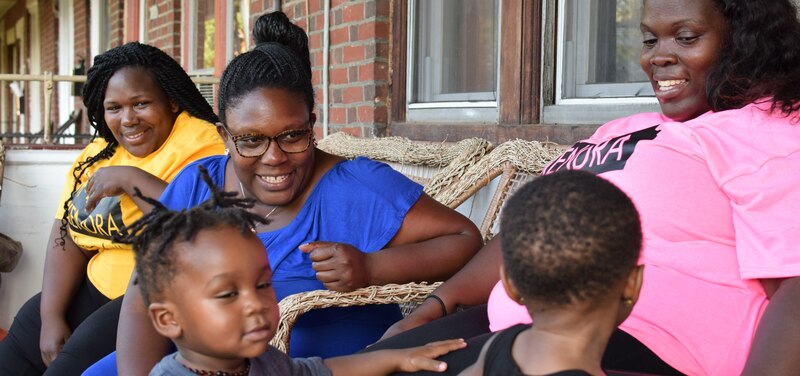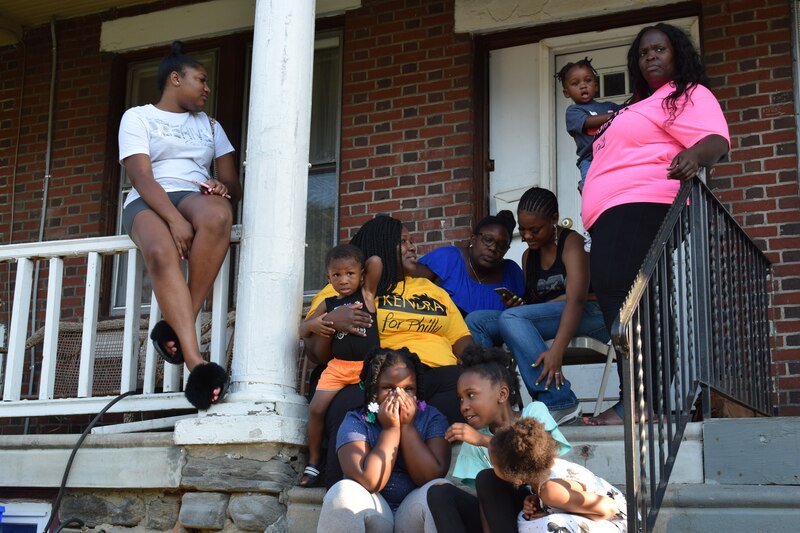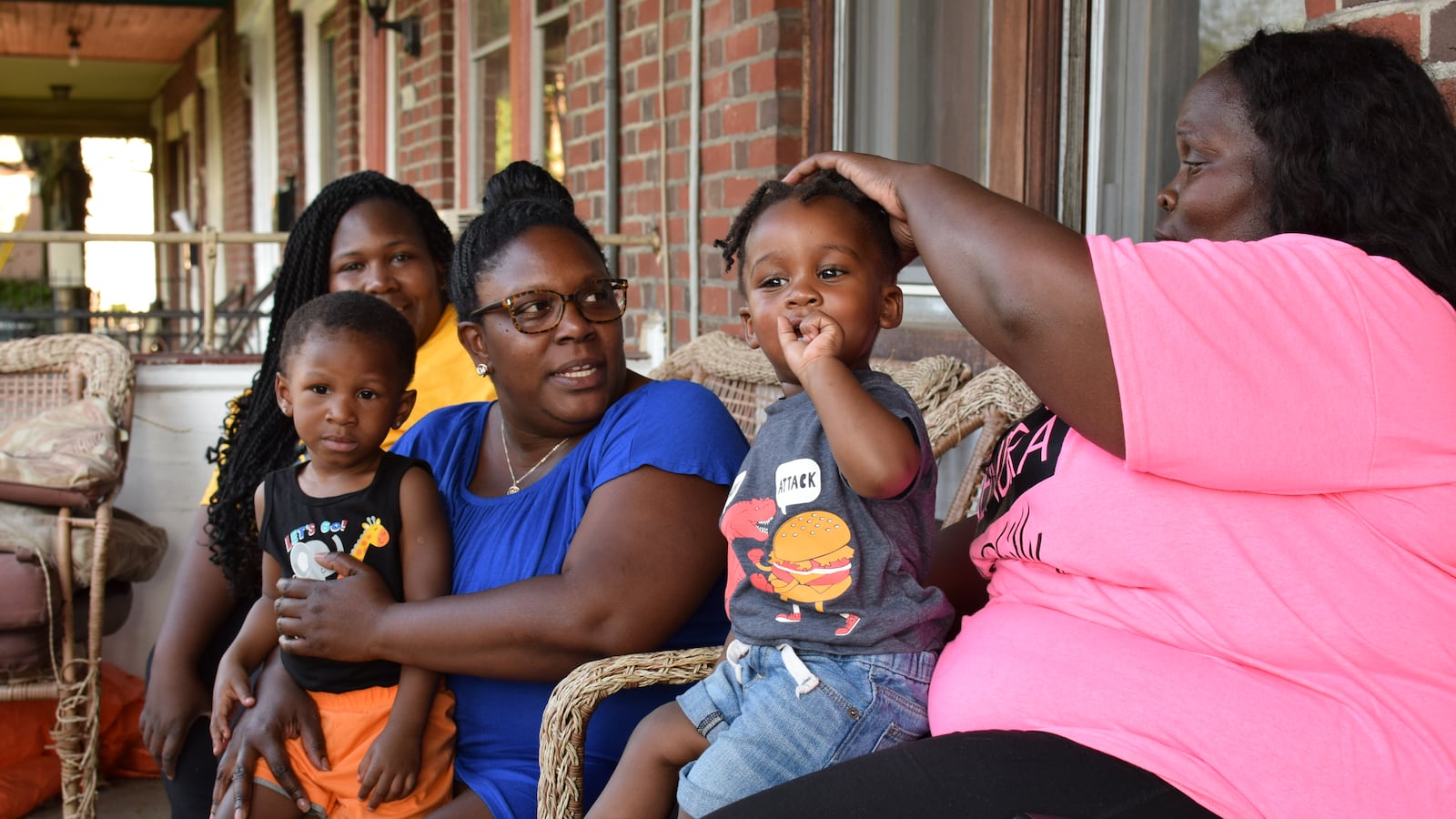This article was originally published in The Notebook. In August 2020, The Notebook became Chalkbeat Philadelphia.
North Philadelphia activist Kendra Brooks sat on the porch of her rowhome with family and neighbors, chatting about the thousands of petition signatures she was about to file to get on the November ballot for a City Council at-large seat — running as an independent for one of the minority seats held by Republicans. The July heat hung heavy, but the women on her porch weren’t bothered. They were excited.
“I live in a forgotten part of the city,” Brooks said of Nicetown — the neighborhood she grew up in and never intends to leave. “This is North Philly. We don’t have high voter turnout. We don’t have a lot of money. We don’t have anything that moves politicians.”
She gestured around at the block surrounding her porch.
“These are the people I’ve fought on the front lines with — whether it was on schools or street cleaning.”
Brooks is running on the Working Families party ticket, alongside the Rev. Nicolas O’Rourke. In many ways, Brooks’ campaign reflects an insurgent progressive movement within the Democratic Party, even though she’s running outside of it. She started in Nicetown activism five years ago through her fight to keep the local neighborhood school from being turned over to a charter organization and to have the School District make further investments in it instead. Since then, she’s expanded that work to take on a range of progressive causes — gentrification, restorative justice, youth violence, affordable housing, and homelessness.
In her first 100 days, Brooks said, she would focus on policies to secure more funding for schools, such as ending the city’s 10-year tax abatement; protections for tenants and homeowners in gentrifying neighborhoods; and strengthening services for the city’s homeless population.
“People should be able to live a good life as a working-class person,” Brooks said. “Some had that at one time: solid union jobs with benefits. You could send your kids to college. The next generation after my parents, we weren’t able to sustain that quality of life.
“But those are basic human needs.”
Brooks also has a passion for mobilizing voters disaffected with the political system — so disaffected they don’t vote. It’s a reflection of her own life.
“We need one of us in those seats,” Brooks said. “Everything on my platform, for some folks in office, it’s just theory. I’m talking about my lived experiences. There’s nothing on my platform that I haven’t lived through.”
Both Brooks and O’Rourke are asking both independents and Democrats to vote for the two of them in November. To do so, Democrats would have to vote for just three out of the five at-large Democratic candidates, but in Philadelphia, those candidates typically receive three times the number of votes as the highest-scoring Republicans. So the chances of Brooks knocking off a Democrat are almost nonexistent.
In order for her to win a seat, she would have to be among the two highest vote-getters who aren’t Democrats.
“It’s an opportunity to strengthen the Democratic vote in this city,” Brooks said. “It’s an opportunity for us to mobilize more black and brown folks who feel excluded from the system.”
The rift between progressives and Democratic Party leadership that is evident on the national stage has spilled into this race as well. Party leader Bob Brady has criticized Brooks and O’Rourke, while many of the city’s progressive groups and politicians have endorsed them. The two have been endorsed by recently elected progressive State Reps. Elizabeth Fiedler, Malcolm Kenyatta, and Chris Rabb, whose first run in 2016 also was opposed by the local Democratic Party.
The ticket has also been endorsed by some of the biggest progressive door-knockers in the city: the Sunrise Movement, 215 People’s Alliance, Neighborhood Networks, the Coalition to Abolish Death by Incarceration, One Pennsylvania, and the faith-based coalition POWER. The Working Families party ticket is also backed by a number of local unions.
“They [leadership] think that I’m fighting against the Democratic Party,” Brooks said. “I don’t care about that. My concern is the issues facing working families in this city.”
Brooks and O’Rourke are among seven non-Democratic at-large candidates to meet the filing deadline. They include Libertarians, members of the Green Party, and independent candidates. What the Working Families ticket intends to do has never succeeded before, but the coalition they have assembled is rare, and the old precedents seem less important with each passing election.
Losing a job to budget cuts
As the women chatted about the neighborhood — the local park, petition-gathering, and recent shootings — they were sitting on the porch of the home that Brooks’ parents owned. After her parents divorced, Brooks took over the mortgage herself while a student at Temple University, at age 21. Years later, she lost her job at Easter Seals of PA, where she coordinated out-of-school programs for young people with special needs over the summer. The program laid off staff due to dramatic budget cuts to state education funding under Republican Gov. Tom Corbett.
In the post-recession economy, she couldn’t find work that paid a comparable middle-class salary. Unemployment ran out. That’s when she began falling behind on her mortgage payments.
“I lost my house in a sheriff’s sale,” Brooks said. “My landlord then offered to let me buy the house back for $25,000, but at the time I could only afford $20,000. So now I rent a house that I used to own.”
And she said the house has been falling apart under a landlord who won’t make significant repairs.
“Displacement and gentrification — for me, that’s personal,” Brooks said. “I’m blessed that I did not end up homeless.
“Just struggling with unstable incomes, anybody could end up homeless. Most people are two or three paychecks away from being homeless. … Rent is just too damn high if you earn $7.25 an hour — even $10 an hour.”
Though her grandmother was a Democratic elections judge, Brooks’ parents were less politically active. For most of her life, Brooks was not as politically conscious as she is now. These experiences — losing her job, fighting for her neighborhood school, having her home auctioned off by the city — have molded her view of city politics.
This disaffection itself is pervasive, though it turns most people into non-voters. Apathy toward the promises of politicians also grips Nicetown, where gentrification is just beginning a gradual creep that, residents fear, will eventually affect them all.
Brooks began her activism as a member of Parents United for Education. She went on to help found Stand Up Nicetown and the Our City Our Schools Coalition. After the Coalition led a campaign to bring an end to the state-controlled School Reform Commission and return the city’s schools to local control, Mayor Kenney picked Brooks for the panel that nominated new school board members.
Hers was a gradual transition, from disaffected neighbor to resident activist.
“When I worked at Easter Seals, back then politics for me was making sure my families with children with disabilities had access to everything they needed,” she said. “I invested my whole life in that program. Jobs in my community came from that program, internships for young people — all these things. It became who I was.”
So after the layoffs, Brooks started looking for another job, and meanwhile found gratifying volunteer work at Steel Elementary, the school her five children relied on. Her youngest child just graduated from Steel and will attend Hill Freedman World Academy next year. Brooks went on to become president of Steel’s School Advisory Council, where she worked with parents, neighbors, and staff to bring resources into the school.
“I went from being that parent who could donate so all the kids could get on the bus for the class trip, to being that parent who had to ask for money so my child could get on the bus,” Brooks said. “I understand what it’s like to be on unemployment and public assistance, and what it’s like to make just a bit more than minimum wage — having to renegotiate how we live our lives.”

Kendra Brooks (center) and her sisters talk with her nephews on her porch in Nicetown. (Photo: Greg Windle).
She was in the middle of trying to form a Home & School Association in 2014 when she got the unexpected news that the District was considering turning the school over to Mastery Charter. The news came from a personal friend. Brooks contacted the school’s principal, who knew nothing about it. So she called a community meeting at the school. It was one of her first experiences dealing directly with public officials and the illusion of community engagement.
“Officials from 440 [School District headquarters] came in and took over our meeting with their own agenda, saying that our meeting was not going to happen,” Brooks said. “From then on, we organized all our meetings outside the school, because I realized at that point that the School District was not our ally.”
Through these meetings, Brooks organized parents to fight for their own vision of the school. In the end, Mastery backed out after the parents voted down a charter proposal, and Brooks worked with the District and community members to design an improvement plan for the school. The community wanted money invested in support staff, particularly counselors. The District agreed, but did not fund the plan, she said. The District did, however, ask teachers to reapply for their jobs and got rid of many. (One of those who left was later awarded Teacher of the Month at her new school.)
Three years later, the District threw Steel back into the turnaround process, though this time there was no community voting. In the end, Brooks said, it appeared to her that the District “engineered” a crisis at Steel.
“There’s a disconnect between the community, working with the first level of school governance [principals], and the governance of the School District,” Brooks said. “That’s just like the committee structure and ward leaders and City Hall.”
It takes organizers who can mobilize grassroots pressure to influence either system at the top. The bottom is a place where complaints are made to those without the power to change the system.
The community kept fighting through the second turnaround process in 2017. In the years since, Brooks said, she was glad to see the District made investments in modernizing the school’s K-3 classrooms. But the problems with turnover that started back in 2014 have persisted, and the school is now on its third principal since then.
“As we went up the food chain, we got more exposure. But we were also organizing parents on the ground at the same time,” Brooks said. “Organizing folks who politicians thought couldn’t be organized, that was powerful. … Many of these same parents have moved on to organize around their own issues: housing, wages, healthcare, whatever.”
“That was my first step towards realizing that everything is political,” Brooks said. “Before that it never occurred to me that I was already political. It was based on my experience with politicians I had met. I didn’t like those people. They didn’t want anything to do with supporting people like me and those in my community.… Some of them are powerless because they choose to be.”
But through her fight in the early years at Steel, she came to view politics differently. She concluded that our entire lives are political, whether we like it or not — whether we chose to vote or stay at home.
“I realized education is connected to housing, to wages, to the environment – all these bigger things,” Brooks said. It started to make sense to her that politics did not represent the interests of poor and marginalized people. And it only made her more upset with the system. “Once you know this, you can’t undo it. You can’t go back. And you have a responsibility for those who don’t know.”
Running for office “is offense. We keep fighting for power, but this opportunity is about taking power. Putting the movement in a different position — so we’re not always on defense.”
Brooks eventually found paid work as a contractor, training school staff on restorative practices. That is an approach to discipline that rejects harsh punishments, and instead connects victims with perpetrators to find a resolution that satisfies the whole community.
Deciding to run
After realizing the power of organizing, Brooks decided to use her army of local volunteers to try to pull off a political upset by reaching out to communities where political door-knockers are rare.
“The system we currently have has always worked against working people,” Brooks said. “So I tell them everything we’re fighting for and what we’re fighting against. We have crumbling schools. We can’t make enough money, even though we work hard at three jobs for pennies while we live in crappy houses that we’re paying full rent for. So why are we voting? How does this system make our lives better?
“People have been so disenfranchised by the system that they don’t believe in it. But everything we do is political, and if we don’t get involved, then we will get chewed up by this system.
“When we talk about changing the system, that’s what gets working people motivated to vote.”

Kendra Brooks (in blue) with her sisters, daughters, nephews and grandchildren on her porch in Nicetown. (Photo: Greg Windle)

